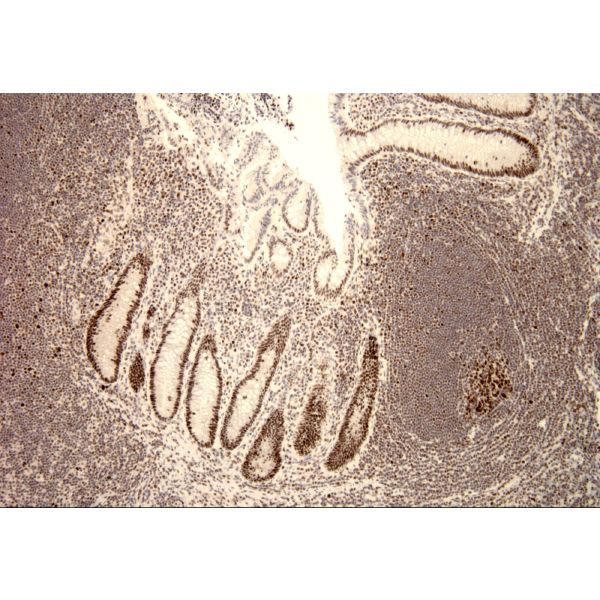Anti-MLH1, mouse monoclonal, 0,1 ml, Species x-Reactivity: human, Applications: IHC
MLH1
Cat#: BSH-7208-100 100ul, BSH-7208-1 1ml, BSH-7208-RTU 7ml
Clone: BS29
S/R: human
Application: IHC
DNA-mismatch repair (MMR), a conserved process that involves correcting errors made during DNA synthesis, is crucial to the maintenance of genomic integrity. Lack of a functional DNA-mismatch repair pathway is a common characteristic of several different types of human cancers, either due to an MMR gene mutation or promoter-methylation gene silencing. MLH1 is a human homolog of the E. coli DNA mismatch repair gene mutL, consistent with the characteristic alterations in microsatellite sequences (RER+ phenotype) found in hereditary nonpolyposis colon cancer (HNPCC). MLH1 is an integral part of the protein complex responsible for mismatch repair expressed in lymphocytes, heart, colon, breast, lung, spleen, testis, prostate, thyroid and gall bladder, and is methylated in several ovarian tumors. Loss of MLH1 protein expression is associated with a mutated phenotype, microsatellite instability and a predisposition to cancer. In hereditary nonpolyposis colorectal cancer (HNPCC), an autosomal dominant inherited cancer syndrome that signifies a high risk of colorectal and various other types of cancer, the MLH1 gene exhibits a pathogenic mutation. Inactivation of the MLH1 gene causes genome instability and predisposition to cancer. MLH1 also plays a role in meiotic recombination.
 |
 |
 |
| Normal tonsil (A, B) and normal appendix (C) have stained with MLH1 (Clone: BS10) optibody using 1:250 dilution and pH9 tris-EDTA pretreatment. Germinal center cells as well as enterocytes have strong cytoplasmic label. Moderate label observed from cells of the mantle zone. | ||
| Price | 1.155,00 RON (preturile sunt fara TVA) | ||||||
|---|---|---|---|---|---|---|---|
| Description |
MLH1 Cat#: BSH-7208-100 100ul, BSH-7208-1 1ml, BSH-7208-RTU 7ml DNA-mismatch repair (MMR), a conserved process that involves correcting errors made during DNA synthesis, is crucial to the maintenance of genomic integrity. Lack of a functional DNA-mismatch repair pathway is a common characteristic of several different types of human cancers, either due to an MMR gene mutation or promoter-methylation gene silencing. MLH1 is a human homolog of the E. coli DNA mismatch repair gene mutL, consistent with the characteristic alterations in microsatellite sequences (RER+ phenotype) found in hereditary nonpolyposis colon cancer (HNPCC). MLH1 is an integral part of the protein complex responsible for mismatch repair expressed in lymphocytes, heart, colon, breast, lung, spleen, testis, prostate, thyroid and gall bladder, and is methylated in several ovarian tumors. Loss of MLH1 protein expression is associated with a mutated phenotype, microsatellite instability and a predisposition to cancer. In hereditary nonpolyposis colorectal cancer (HNPCC), an autosomal dominant inherited cancer syndrome that signifies a high risk of colorectal and various other types of cancer, the MLH1 gene exhibits a pathogenic mutation. Inactivation of the MLH1 gene causes genome instability and predisposition to cancer. MLH1 also plays a role in meiotic recombination.
|
||||||

 English
English




